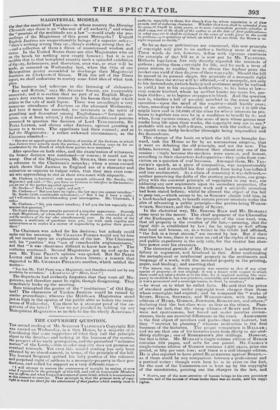MAGISTERIAL MODELS.
OH that the uncivilized Yankees—in whose country the Morning Chronicle says there is an "absence of all authority," and where the" passions of the multitude are a law —would study the pro- ceedings of the Magistracy of this great Metropolis ! Unpaid English Justices are unquestionably beings of a superior order- " there's nothing wrong they say, there's nothing wrong they do" —and a collection of them a divan of unsurpassed wisdom and virtue. In the United Slates there are also Magistrates who sit on the bench for nothing save empty honour ; but it is not credible that in that benighted country such a splendid exhibition of dignity, forbearance, and discretion, ever was, or ever will be made, as occurred on Wednesday last, when the Mite of our Metropolitan gentry assembled to discharge their Magisterial functions on Clerkenwell Green. With the aid of the Times report, we shall endeavour to convey some faint idea of what took
place.
The business had reference to the licensing of alehouses. *Beer and Britain," says Mr. SYDNEY SMITH, are inseparably connected ; and it is certain that no part of an English Magis- trate's duty excites more interest in his bosom than that which relates to the sale of malt liquor. There was accordingly a very numerous attendance of Justices on the aforesaid Wednesday. And hem it must be recorded, (so inveterate is the spirit of grumbling and discontent among Englishmen—" fortunati ni- sua si bona nfirint;') that certain ill-conditioned persons presumed to question the decision of Lord TEIGNISIOUTH, Sir Pose LAURIE, and eleven other Justices, against granting a licence to a tavern. The appellants had their counsel ; and so hod the Magistrates ; a rather awkward circumstance, as the Chairman admitted-
Herewas an appeal against the decision of certain of the Justices, to which those Justices were actuslly made the parties; which decision came on for re- consideration by the Bench of which those parties were members."
After speeches on both sides, and the examination of witnesses, the former decision was confirmed—of course ; it could not be wrong. One of the Magistrates, Mr. STOCKS, then rose to speak in reference to the Chairman's remarks ; when a scene ensued which shows that Justices in England are of a character and estimation so superior to vulgar rules, that they may even com- mit acts approaching to riot in their own court with impunity.
Mr. Clarkson (a barrister) with some warmth addressed Mr. Stocks, (the Magistrate) and said—" Sic, you have no business to interfere in the business; you are one of the parties ancaled against."
Mr. Stocks—" But I have a right, and will."
Mr. Clarkson—. But you have no right ; the law says you cannot interfere." Mr. Stocks (with considerable vehemence)—" But I say I have a right ; and I will exercise it notwithstanding your interruption. Mr. Cbait man, I wish—
Mr. Clarkson—" Sir, you cannot interfere; I tell you the law especially de- termines that question."
The Court during these remarks presented a singular appearance. Scarcely a single Magistrate, of whom there were a large number, retained his seat, and the members of the, bar also simultaneously rose. In the midst of the confusion, a multitude of questions were put, but with such rapidity and indistinctness as to render it a matter of impossibility to gather their precise object."
The Chairman was asked for his decision; but nobody could make out his meaning. Sir CHABLEs Foans:s would not let him off, hut insisted upon an explanation of the law. The Chairman said, his "position" was "one of considerable unpleasantness," and that "it was oftentimes difficult to know how to act." The confusion continued. Several Magistrates got up and spoke at once. Mr. TIDD PRATT'S opinion was quoted. But Sir PETER LAURIE said that he was only a beam tenens; a remark that suggested to Mr. CHARLES PHILLIPS another, which settled the matter- " Yes, but Mr. Tidd Pratt was a Magistrate, and therefore could not by any possibility be mistaken." (Loud CI ies of" Hear, hear!") The disputants had evidently forgotten that they were all Ma- gistrates, and therefore must be right, though disagreeing. They immediately broke up the meeting. Here triumphed the genius of the " institutions" of Old Eng- land! The characters of Yankee Justices would be ruined by similar proceedings; whereas the Middlesex Magistrates stand just as high in the opinion of the public after as before the occur- rences of Wednesday. Can there be a stronger proof of the su- periority of the latter? Were we not justified itt bolding up our Metropolitan Magistrates as models to the disorderly Americans ?


























 Previous page
Previous page